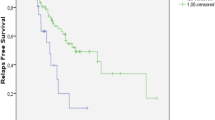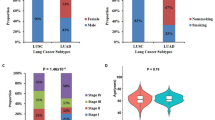Abstract
Purpose
New therapeutic approaches are being developed based on findings that several genetic abnormalities underlying non-small-cell lung cancer (NSCLC) can influence chemosensitivity. The identification of molecular markers, useful for therapeutic decisions in lung cancer, is thus crucial for disease management. The present study evaluated single-nucleotide polymorphisms (SNPs) in XRCC3, XPD and Aurora kinase A in NSCLC patients in order to assess whether these biomarkers were able to predict the outcomes of the patients.
Methods
The Spanish Lung Cancer Group prospectively assessed this clinical study. Eligible patients had histologically confirmed stage IV or IIIB (with malignant pleural effusion) NSCLC, which had not previously been treated with chemotherapy, and a World Health Organization performance status (PS) of 0–1. Patients received intravenous doses of vinorelbine 25 mg/m2 on days 1 and 8, and cisplatin 75 mg/m2 on day 1, every 21 days for a maximum of 6 cycles. Venous blood was collected from each, and genomic DNA was isolated. SNPs in XRCC3 T241M, XPD K751Q, XPD D312N, AURORA 91, AURORA 169 were assessed.
Results
The study included 180 patients. Median age was 62 years; 87 % were male; 34 % had PS 0; and 83 % had stage IV disease. The median number of cycles was 4. Time to progression was 5.1 months (95 % CI, 4.2–5.9). Overall median survival was 8.6 months (95 % CI, 7.1–10.1). There was no significant association between SNPs in XRCC3 T241M, XPD K751Q, XPD D312N, AURORA 91, AURORA 169 in outcome or toxicity.
Conclusions
Our findings indicate that SNPs in XRCC3, XPD or Aurora kinase A cannot predict outcomes in advanced NSCLC patients treated with platinum-based chemotherapy.
Similar content being viewed by others
References
Scagliotti GV, Parikh P, von Pawel J, Biesma B, Vansteenkiste J et al (2008) Phase III study comparing cisplatin plus gemcitabine with cisplatin plus pemetrexed in chemotherapy-naive patients with advanced-stage non-small-cell lung cancer. J Clin Oncol 26:3543–3551
Fossella F, Pereira JR, Von Pawel J, Pluzanska A, Gorbounova V et al (2003) Randomized, multinational, phase III study of docetaxel plus platinum combination versus vinorelbine plus cisplatin for advanced non-small cell lung cancer: the TAX 326 study group. J Clin Oncol 21:3016–3024
Gebbia V, Galette D, Caruso M, Verderame F, Pezzella G et al (2008) Cisplatin plus weekly vinorelbine versus cisplatin plus vinorelbine on days 1 and 8 in advanced non-small cell lung cancer: a prospective randomized phase III trial of the G.O.I.M. (Gruppo Oncologico Italia Meridionale). Lung Cancer 3:369–377
Gottesman MM, Fojo T, Bates SE (2002) Multidrug resistance in cancer: role of ATP-dependent transporters. Nat Rev Cancer 2:48–58
van de Vaart PJ, Belderbos J, de Jong D, Sneeuw KC, Majoor D et al (2010) DNA-adduct levels as a predictor of outcome for NSCLC patients receiving daily cisplatin and radiotherapy. Int J Cancer 89:160–166
Furuta T, Ueda T, Aune G, Sarasin A, Kraemer KH et al (2002) Transcription-coupled nucleotide excision repair as a determinant of cisplatin sensitivity of human cells (2002). Cancer Res 62:4899–4902
de las Penas R, Sanchez-Ronco M, Alberola V, Taron M, Camps C et al (2006) Polymorphisms in DNA repair genes modulate survival in cisplatin/gemcitabine-treated non-small-cell lung cancer patients. Ann Oncol 17:668–675
Aloyz R, Zy Xu, Bello V, Bergeron J, Han FY et al (2002) Regulation of cisplatin resistance and homologous recombinational repair by the TFIIH subunit XPD. Cancer Res 62:5457–5462
Spitz MR, Wu X, Wang Y, Wang LE, Shete S et al (2001) Modulation of nucleotide excision repair capacity by XPD polymorphisms in lung cancer patients. Cancer Res 61:1354–1357
Gurubhagavatula S, Liu G, Park S, Zhou W, Su L et al (2004) XPD and XRCC1 genetic polymorphisms are prognostic factors in advanced non-small-cell lung cancer patients treated with platinum chemotherapy. J Clin Oncol 22:2594–2601
Gautschi O, Heigway J, Mack P, Purnell PR, Lara PN et al (2008) Aurora kinases as anticancer drug targets. Clin Cancer Res 14:1639–1648
Lapenna S, Giordano A (2009) Cell cycle kinases as therapeutic targets for cancer. Nat Rev Drug Discov 8:547–566
Mora-Bermudez F, Gerlich D, Ellenberg J (2007) Maximal chromosomes compaction occurs by axial shortening in anaphase and depends on aurora kinase. Nat Cell Biol 9:822–831
Soncini C, Carpinelli P, Gianelli L, Fancelli D, Vianello P et al (2006) PHA-680632 a novel aurora kinase inhibitor with potent antitumoural activity. Clin Cancer Res 12:4080–4089
Wilkinson RW, Odedra R, Heaton SP, Wedge SR, Keen NJ et al (2007) AZD 1152, a selective inhibitor of aurora B kinase, inhibits human xenograft growth by inducing apoptosis. Clin Cancer Res 13:3682–3688
Tong T, Zhong Y, Kong J, Dong L, Song Y et al (2004) Overexpression of Aurora-A contributes to malignant development of human esophageal squamous cell carcinoma. Clin Cancer Res 10(7304):7310 Erratum in: Clin Cancer Res. 2005 Jun 15;11(12):4635
Li D, Zhu J, Firozi PF, Abbruzzese JL, Evans DB et al (2003) Overexpression of oncogenic STK15/BTAK/Aurora A kinase in human pancreatic cancer. Clin Cancer Res 9:991–997
Sakakura C, Hagiwara A, Yasuoka R, Funjita Y, Nakanishi M et al (2001) Tumour amplified kinase BTAK is amplified and overexpressed in gastric cancers with possible involvement in aneuploid formation. Br J Cancer 84:824–831
Sen S, Zhou H, Zhang RD, Yoon DS, Vakar-Lopez G et al (2002) Amplification/overexpression of a mitotic kinase gene in human bladder cancer. J Natl Cancer Inst 94:1320–1329
Miyoshi Y, Iwao K, Egawa C, Noguchi S (2001) Association of centrosomal kinase STK15/BTAK mRNA expression with chromosomal instability in human breast cancers. Int J Cancer 92:370–373
Gritsko TM, Coppola D, Paciga JE, Yang L, Sun M et al (2003) Activation and overexpression of centrosome kinase BTAK/Aurora- A in human ovarian cancer. Clin Cancer Res 9:1420–1426
Chung CM, Man C, Jin Y, Guan XY, Wang Q et al (2005) Amplification and overexpression of aurora kinaseA (AURKA) in immortalized human ovarian epithelial (HOSE) cells. Mol Carcinog 43:165–174
Tanaka E, Hashimoto Y, Ito T, Okumura T, Kan T et al (2005) The clinical significance of Aurora-A/STK15/BTAK expression in human esophageal squamous cell carcinoma. Clin Cancer Res 11:1827–1834
Tong T, Zhong Y, Kong J, Dong L, Song Y et al (2004) Overexpression of Aurora-A contributes to malignant development of human esophageal squamous cell carcinoma. Clin Cancer Res 10:7304–7310
Reiter R, Gais P, Jütting U, Steuer-Vogt MK, Pickhard A et al (2006) Aurora kinase A messenger RNA overexpression is correlated with tumour progression and shortened survival in head and neck squamous cell carcinoma. Clin Cancer Res 12:5136–5141
Ruan Y, Song AP, Wang H, Xie YT, Han JY et al (2011) Genetic polymorphisms in AURKA and BRCA1 are associated with breast cancer susceptibility in a Chinese Han population. J Pathol 225:535–543
Sun H, Bai J, Chen F, Jin Y, Yu Y et al (2011) Lack of an association between AURKA T91A polymorphisms and breast cancer: a meta-analysis involving 32,141 subjects. Breast Cancer Res Treat 125:175–179
Liu L, Yuan P, Wu C, Zhang X, Wang F et al (2011) Assessment of XPD Lys751Gln and XRCC1 T-77C polymorphisms in advanced non-small-cell lung cancer patients treated with platinum-based chemotherapy. Lung Cancer 73:110–115
Wei S-Z, Zhan P, Shi M, Qian Q, Yu L, Song Y (2011) Predictive value of ERCC1 and XPD polymorphism in patients with advanced non-small cell lung cancer receiving platinum-based chemotherapy: a systematic review and meta-analysis. Med Oncol 28:315–321
Yin M, Yan J, Voutsina J, Tibaldi C, Christiani DC et al (2011) No evidence of an association of ERCC1 and ERCC2 polymorphisms with clinical outcomes of platinum-based chemotherapies in non-small cell lung cancer: a meta-analysis. Lung Cancer 73:370–377
Wei HB, Hu J, Shang LH, Zhang YY, Lu FF et al (2012) A meta-analytic review of ERCC1/MDR1 polymorphism and chemosensitivity to platinum in patients with advanced non-small cell lung cancer. Chin Med J 125:2902–2907
Yin JY, Huang Q, Zhao YC, Zhou HH, Liu ZQ (2012) Meta-analysis on pharmacogenetics of platinum-based chemotherapy in non small cell lung cancer (NSCLC) patients. PLoS ONE 7:e38150
Giachino DF, Ghio P, Regazzoni S, Mandrile G, Novello S et al (2007) Prospective assessment of XPD Lys751Gln and XDCC1 Arg399Gln single nucleotide polymorphisms in lung cancer. Clin Cancer Res 13:2876–2881
Martoni A, Marino A, Sperandi F, Giaquinta S, Di Fabio F et al (2005) Multicentre randomised phase III study comparing the same dose and schedule of cisplatin plus the same schedule of vinorelbine or gemcitabine in advanced non-small cell lung cancer. Eur J Cancer 41:81–92
Georgoulias V, Ardavanis A, Tsiafaki X, Agelidou A, Mixalopoulou P et al (2005) Vinorelbine plus cisplatin versus docetaxel plus gemcitabine in advanced non-small-cell lung cancer: a phase III randomized trial. J Clin Oncol 1:2937–2945
Gebbia V, Galetta D, Lorusso V, Caruso M, Verderame F et al (2008) Cisplatin plus weekly vinorelbine versus cisplatin plus vinorelbine on days 1 and 8 in advanced non-small cell lung cancer: a prospective randomized phase III trial of the G.O.I.M. (Gruppo Oncologico Italia Meridionale). Lung Cancer 61:369–377
Provencio M, Blanco R, Alberola V, Isla D, Massuti B et al. (2007) Cisplatin plus vinorelbine as first-line treatment for patients with advanced non-small cell lung cancer: molecular correlates. In: 14th European cancer conference, ECCO 14, Barcelona, pp 23–27. September, 2007
Yang H, He L, Kruk P, Nicosia SV, Cheng JQ (2006) Aurora-A induces cell survival and chemoresistance by activation of Akt through a p53-dependent manner in ovarian cancer cells. Int J Cancer 119:2304–2312
Anand S, Penrhyn-Lowe S, Venkitaraman AR (2003) AURORA-A amplification overrides the mitotic spindle assembly checkpoint, inducing resistance to Taxol. Cancer Cell 3:51–62
Pan JY, Ajani JA, Gu J, Gong Y, Quin A et al (2012) Association of Aurora-A (STK15) kinase polymorphisms with clinical outcome of esophageal cancer treated with preoperative chemoradiation. Cancer 118:4346–4353
Viñolas N, Provencio M, Reguart N, Cardenal F, Alberola V et al (2011) Single nucleotide polymorphisms in MDR1 gen correlates with outcome in advanced non-small-cell lung cancer patients treated with cisplatin plus vinorelbine. Lung Cancer 71:191–198
Acknowledgments
The authors thank the monitors, nurses, other support staff and the patients participating in the study. They also thank Francisco Javier Pérez for the statistical analysis. The authors also wish to thank Martin Hadley-Adams for assisting with the English language and preparing the manuscript.
Author information
Authors and Affiliations
Corresponding author
Additional information
This study was carried out on behalf of the Spanish Lung Cancer Group.
Rights and permissions
About this article
Cite this article
Provencio, M., Camps, C., Cobo, M. et al. Prospective assessment of XRCC3, XPD and Aurora kinase A single-nucleotide polymorphisms in advanced lung cancer. Cancer Chemother Pharmacol 70, 883–890 (2012). https://doi.org/10.1007/s00280-012-1985-9
Received:
Accepted:
Published:
Issue Date:
DOI: https://doi.org/10.1007/s00280-012-1985-9




